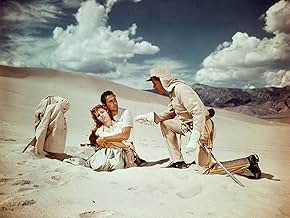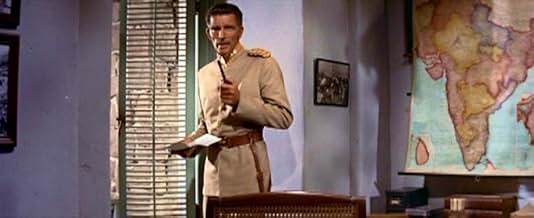Füge eine Handlung in deiner Sprache hinzuA half-caste British officer in 19th-century India battles the prejudices of both his Army colleagues and the local populace while trying to help put down a rebellion led by a greedy local r... Alles lesenA half-caste British officer in 19th-century India battles the prejudices of both his Army colleagues and the local populace while trying to help put down a rebellion led by a greedy local ruler.A half-caste British officer in 19th-century India battles the prejudices of both his Army colleagues and the local populace while trying to help put down a rebellion led by a greedy local ruler.
- Auszeichnungen
- 1 Nominierung insgesamt
- Ali Nur
- (as Frank de Kova)
- Native Dancer
- (as Sujata)
- Servant
- (Nicht genannt)
- Bit Role
- (Nicht genannt)
- Afridi Horseman
- (Nicht genannt)
- Soldier
- (Nicht genannt)
- Afridi Horseman
- (Nicht genannt)
- Hamid Bahri
- (Nicht genannt)
- Singer
- (Nicht genannt)
Empfohlene Bewertungen
King directed many of Power's best pictures including "In Old Chicago," "Alexander's Ragtime Band," "Jesse James," "The Black Rose," "Captain From Castile" and "Prince of Foxes"...
Power was a great actor able to star in everything from Musicals and Westerns to historical epics and swashbucklers... He was originally meant to do the first CinemaScope film, "The Robe" in 1953, but ended up with "The King of the Khyber Rifles" instead.
Power gives adequate performance as Alan King, a half-caste British army captain charging around the hills of India with courage and pride...
He crushes a rebel uprising led by a boyhood friend, and engages in a fight-to-the-death... He struggles up and down rocky cliffs of the Himalayan Mountain Ranges and romances his commanding officer's daughter... all against the backdrop of a legendary Indian Mutiny (also called Sepoy Mutiny)
Michael Rennie is cast as the tall Brigadier General Maitland who judges King (Tyrone Power) by his special qualifications, appointing him commander of the Khyber Riflemen...
Rennie's pretty daughter Susan (Terry Moore) finds herself attracted to the handsome captain, causing a rivalry between King and Lieutenant Heath (John Justin), the officer who spread the news about King's mixed racial descent...
Guy Rolfe is the ruthless Karram Khan, a rebel who tries to end the British rule... He warns King: "Last night you spare my life, now I return the gesture. But we will meet again and when we do, there will be no hesitation."
The most dramatic moment of the motion picture is the spearing to death of four helpless British captives tied to a long wooden mast, waiting in fear to be executed by Khan's men... Power is also fastened, expecting the same fate, to be thrust in the chest by a deadly weapon...
The film, spectacularly directed by a sure-handed craftsman, is sufficiently picturesque with bright and shining landscapes, very entertaining with an alarming storm and a rousing climax in which Power leads a furious assault filling the giant CinemaScope screen with impressive action sequences...
Top desert caper that was all audiences wanted to see in the 50's. No-one swashbuckled better than Tyrone Power during this period and KING OF THE KHYBER RIFLES was a handsome production, especially on the gigantic CINEMASCOPE screen. Directed by action-specialist Henry King, who worked with Power in almost a dozen movies, the story was that of half-caste British soldier Alan King (Power) who had to battle not only Army etiquette but a rampaging uprising around the Khyber Pass! The well remembered image from this flick was the spearing of the helpless British soldiers at the stake. Power of course, gaining a last minute reprieve so he could complete the movie, take down the villains and win the girl.
Good supporting cast, Michael Rennie in particular cutting an impressive figure as Brigadier Maitland whose stiff upper lip was stiffer than most!
Good companion piece to this was ZARAK (Also reviewed somewhere!)
A great pity for a great story to be so poorly handled and reduced to mere superficial entertainment. Talbot Mundy was a theosophist and mystic who wrote many books, and this one could have been made into as great a Kipling epic as "The Man who Wanted to be King".
KING OF THE KHYBER RIFLES explores King's personal difficulties as he tries to find his own social position, living in uneasy suspension between the world of the native and the foreign sahibs, torn between them; only the adventurous experience can resolve his status. Prejudice against King emerges because of his parentage; fellow officers refuse to be billeted in the same quarters, and he is conspicuously not invited to the queen's birthday ball. The stress is not simply on his courage but more on the numerous challenges he must face in daily living. A social outcast at the fort, King is most secure in the home of his adopted father, Hamid Bahra, a Moslem holy man; the picture was originally to end with King returning to Bahra before joining Susan. KING OF THE KHYBER RIFLES has a lone hero and none of the emphasis on military camaraderie, or the careless, Boys' Own tone to be found in such films as GUNGA DIN. Authentic details of Indian atmosphere convey a sense of accuracy, such as the rumors that the cartridges for the new Enfield rifles are greased with pig's fat, simultaneously offending Moslem and Hindu alike. King must use his unique appeal as a fellow native to lead the Khyber Rifles in an attack on Khan's encampment. At the last moment, King's men resolve not to use the rifles but offer to follow him using their knives. The imperial conflict is between men who are sons of India, whether Kurram Khan and his followers or King and the Khyber Rifles. Yet KING OF THE KHYBER RIFLES ultimately evades the question of the desire for Indian independence, through depicting Kurram Khan's leadership as far more ruthless and dictatorial than British rule. King is in a unique position; his half-caste status, negotiating between British and Indian with a knowledge of both, enables a British victory, establishing not just his equality within the fort but also his eligibility to marry Susan. The British outpost offers the hero the only world where his merits can win recognition, partaking of both sides of his ancestry by following in his father's military footsteps. King's birthplace and home are India, not England, and though he may serve the British, he does so for the distinction such duty may bring through association with a respected unit like the Khyber Rifles. King secures greater respect than is accorded to white officers like Maitland. While utilizing many of the incidents and motifs of THE LIVES OF A BENGAL LANCER, THE CHARGE OF THE LIGHT BRIGADE, GUNGA DIN, and other such movies, KING OF THE KHYBER RIFLES also sums them up, providing both a commentary and a decisive new turn. KING OF THE KHYBER RIFLES brings Indians to the forefront, honoring the native traditions while still treating heroes and villains according to standardized genre patterns. While clearly an adventure of colonial India in the classical mode, KING OF THE KHYBER RIFLES represents a fundamental shift to an awareness of its own conventions, allowing the film to be watched today more easily than many other adventures of a similar vintage. KING OF THE KHYBER RIFLES was the fourth picture shot in Twentieth Century-Fox's new widescreen process, CinemaScope, and it was widely acclaimed as the the first picture whose action fully justified use of the anamorphic lens. Fox's directing "King" was assigned to it: Henry King, a sixty-seven year old veteran whose career stretched back to the teens, and was a personal favorite of Zanuck as well as a close friend of leading star Tyrone Power. Power, tired of playing action roles, disliked KING OF THE KHYBER RIFLES, and by then was more interested in unusual, challenging character roles. Unfortunately, Zanuck wanted to use Terry Moore, who was already under contract, as the leading lady, a role she sought assiduously despite being completely miscast in the part. Zanuck was enthusiastic about shooting KING OF THE KHYBER RIFLES in Lone Pine, and Henry King agreed that a location trip to India was unnecessary, and the California locale substituted so well that many reviewers believed that at least portions of the picture had been shot in India. Producer Frank Rosenberg selected Bernard Herrmann to write the score, hoping for and receiving something more exotic and less intrusive than the type of martial music Alfred Newman had written for previous Henry King-Tyrone Power adventure films at Fox. KING OF THE KHYBER RIFLES was widely touted as Fox's Christmas release, becoming a box-office hit, and it is still popular on television.
Wusstest du schon
- WissenswertesTyrone Power was widely considered too old for his character, as well as unconvincing as an officer in the British army.
- PatzerCaptain King's pocket watch contains photographic images of his parents (~12:00) which must predate their stated 1833 date of death. The earliest known photograph of a person by Daguerre is from 1838 and were all exposed onto metallic silver plates.
- Zitate
Brig. Gen. J. R. Maitland: You can't marry him Susan
Susan Maitland: Say what you're thinking Father!
Brig. Gen. J. R. Maitland: He's a half caste...
- VerbindungenEdited into Time Tunnel: Night of the Long Knives (1966)
Top-Auswahl
- How long is King of the Khyber Rifles?Powered by Alexa
Details
- Erscheinungsdatum
- Herkunftsland
- Sprachen
- Auch bekannt als
- King of the Khyber Rifles
- Drehorte
- Alabama Hills, Lone Pine, Kalifornien, USA(Khyber Pass)
- Produktionsfirma
- Weitere beteiligte Unternehmen bei IMDbPro anzeigen
Box Office
- Budget
- 2.190.000 $ (geschätzt)
- Laufzeit1 Stunde 40 Minuten
- Seitenverhältnis
- 2.55 : 1
Zu dieser Seite beitragen


































